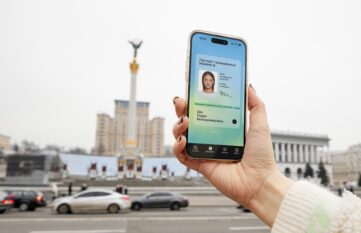
Promoting fair data markets worldwide—Data Economy
Data is the raw material of the digital age: mobile phones, fitness trackers, smart home appliances or cars—they all collect information around the clock. Most of this data is owned by a few technology companies, and the profits from its use flow mainly to the US and China. The African economy can only benefit to a limited extent. But Africa could soon catch up: with its own infrastructure, harmonised data protection laws and cross-border data exchange, countries could achieve a digital breakthrough and stimulate their markets. This is where the BMZ's Data Economy initiative comes in, with the aim of promoting the local data economy.
of the global data centre capacity was located in Africa in 2018.
is the expected annual growth of Africa’s data centre market from 2020 to 2026.
new jobs could be created by the digital market in the six East African Community countries.
In just five years, investment in African tech start-ups has increased more than tenfold, driven by the growing importance of data. BMZ is supporting this positive development with its Data Economy initiative. It supports partner countries in better tapping the economic and social potential of data.
A woman makes digital history: Aissatou Jeanne Ndiaye has developed the first national data strategy on the African continent. It promotes a fair data economy and strengthens Senegal’s competitiveness. Find out how she is revolutionising agriculture and combating climate change here.
Our approach and goal
The Data Economy initiative promotes the development of a fair and inclusive data-driven economy by advancing the implementation of data regulations, testing data sharing to drive local innovation, and supporting local value creation. We strive to create the conditions for citizens, in particular marginalized groups, women, and youth, to have equal access, competences, and opportunities to engage and profit from the digital economies.
Currently, we work on the African continent in collaboration with, amongst others, the Smart Africa Secretariat, the Network of African Data Protection Authorities, national regulators, and private sector and civil society actors, to achieve three main objectives:
Our activities
To support harmonised and interoperable regulations and allow data to create cross-border, regional and continental value in Africa, the Data Economy initiative has contributed to the development of the first African Union (AU) Data Policy Framework, through the BMZ-funded DataCipation project. The Framework provides a set of policy recommendations around data economies in Africa and addresses topics such as:
- enabled data flows
- data protection and digital rights
- data capabilities of African citizens and stakeholders
- data-driven businesses and entrepreneurship
- data sharing and cybersecurity
The AU Data Policy Framework will serve as political orientation for AU Member States, Regional Economic Communities (RECs) and African stakeholders to implement and enforce harmonised data policies, promote cross-border data flows following a standard regulatory foundation, as well as design national strategies in line with the African Union continental approach.
Promoting green data infrastructure
Additionally, climate action and sustainability are important aspects in our global activities. A considerable volume of the world’s data is stored, managed and circulated by data centres, and the amount of data centres is estimated to grow exponentially as data traffic and storage capacity increase. However, data centres consume large amounts of energy, contributing to GHG emissions and use large amounts of water, both directly for liquid cooling and indirectly to produce electricity.
Therefore, Data Economy partners with the World Bank through the Digital Development Partnership (DDP), which brings public and private sector partners together to enhance support to countries in the Global South in the articulation and implementation of digital development strategies.
Our partnership focuses on green and secure data infrastructure (data centres): with our partners, we are currently developing a practitioner’s guide that explores how the public sector, particularly in Low- and Middle-Income Countries, can invest in green public data infrastructure and foster an enabling environment for green data solutions.
Kenya
The Data Economy initiative partners with the Ministry of Agriculture and Livestock Development (MoALD), supporting the implementation of the Agricultural Sector Transformation and Growth Strategy (ASTGS) through the Agricultural Transformation Office (ATO). The two main components of this activity are:
- the Data Governance Framework, designed for stakeholders handling farmer and agriculture-related datasets, to ensure data security, confidentiality and conformity with the GDPR, with a consideration for country contexts. It builds upon existing guidelines and policies and encompasses five central governance pillars
- the Agricultural Sector Data Gateway (ASDG), a platform that allows to aggregate and share data across the agricultural sector to enhance data quality and analytical capacities for the Kenyan Government. This will facilitate support for agricultural production and provide better intelligence to farmers for improved yields and food security.
- The ASDG was awarded by the Open Group India for its exceptional use of the ArchiMate® language and meticulous approach to architecture design from multiple viewpoints. The project was recognised for its benefits to farmers and government, by creating a centralised one-stop-shop for the agriculture sector.
Additional activities to foster enabling data economy regulations and local data value creation in different sectors of the economy are currently being explored.
Senegal
The Government’s ambition, through the Senegal Digital Strategy 2025 (SN2025), is to make Senegal a hub for technological innovation and digital technology for all. In this context, Data Economy supports the Senegalese Ministry of Communication, Telecommunications and Digital Economy (MCTEN), together with Smart Africa and Data-Pop Alliance, in developing a national data strategy with the aim to promote data sharing, enable value creation, and support innovation ecosystems.
The strategy, developed by a national multi-stakeholder task force in line with the AU Data Policy Framework recommendations, will constitute a model for countries in Africa and globally to foster digital sovereignty, economic growth, and equal opportunities in the data economy.
Highly aware of the innovative potential and added value of emerging technologies and in particular artificial intelligence (AI), GIZ, in partnership with Expertise France and the AU-EU D4D Hub project, is currently supporting the Senegalese MCTEN with the elaboration of a complementary national strategy on AI. Additional activities to foster local data value creation through use cases in different sectors of the economy are currently being explored.
South Africa
Jointly with the political initiatives Digital Transformation Centers, FAIR Forward and Blockchain Partnerships, Data Economy will establish a Digital Transformation Centre (DTC) in close partnership with the Department of Forestry, Fisheries and Environment (DFFE) in South Africa. The DTC in South Africa aims to expand the service offers of the GIZ Climate Support Programme from a digital standpoint, by leveraging the use of data and digital technologies for climate action to support South Africa’s Just Transition. The main service offers of the DTC include data policy advice, development of demonstration projects and capacity building.
In addition, the Data Economy initiative pilots a Data & AI Bootcamp for Women in South Africa to promote equal opportunities in the tech field and support women’s professional empowerment through a self-paced, flexible course. The activity will support the development of gender-responsive data-driven technologies, more relevant digital content for women, contributing to women’s economic empowerment on the long-term.
Women Leading Digital—the podcast
Even though women make up half of the world’s population, men clearly outnumber women in the digital world. In 2023, 224 million more men used the internet than women—almost three times the German population. Without the internet, women lack access to information, education, networks, job platforms, financial products and services. This situation is called the digital divide and it is widening.
In the podcast “Women Leading Digital”, we interview brilliant women who are developing new technology and shaping digital change worldwide—despite the challenges they face. We talk to them about the experience of working in a traditionally male-dominated field and what solutions they are developing to bridge the digital divide between genders.





